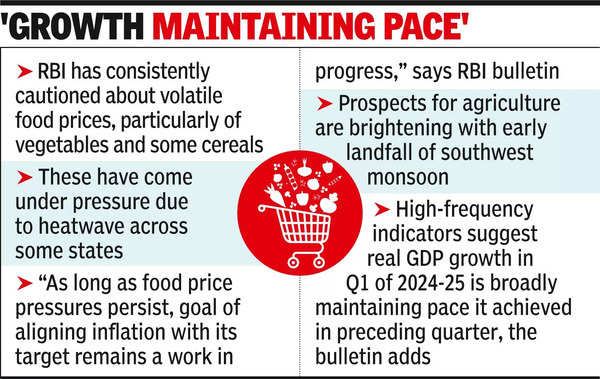The central bank has consistently cautioned about the volatile food prices, particularly of vegetables and some cereals, which have come under pressure due to the heatwave sweeping across some states.While prediction of normal monsoon rains may augur well for crops and improve supplies, the impact of weather related shocks needs close monitoring.
“As long as food price pressures persist, however, the goal of aligning inflation with its target remains a work in progress,” according to the RBI document. The central bank has a target of keeping inflation at 4% (plus/minus 2%).
Latest data showed retail inflation, as measured by the consumer price index (CPI), slowed to a 12-month low of 4.8% in May. Vegetables and pulses prices remained under pressure while core inflation which is estimated after stripping out food and fuel was steady at 3.1%. Food inflation remained unchanged at 7.9%.
The central bank said the prospects for agriculture are brightening with early landfall of southwest monsoon. The stubborn food price pressures have for the time being pushed back any hopes of a cut in interest rates as RBI would like to assess the price situation against the backdrop of the erratic weather patterns, experts say. RBI has kept the policy rate unchanged at 6.5% and has reiterated its stance of remaining focused on the withdrawal of accommodation to ensure that inflation progressively aligns to the target, while supporting growth.
The RBI bulletin said high-frequency indicators suggest the real GDP growth in the first quarter of 2024- 25 is broadly maintaining the pace it achieved in the preceding quarter.
It said that global growth was resilient in the first quarter of 2024 and many central banks have pivoted towards a less restrictive monetary policy stance in response to the fall in inflation in their economies.
